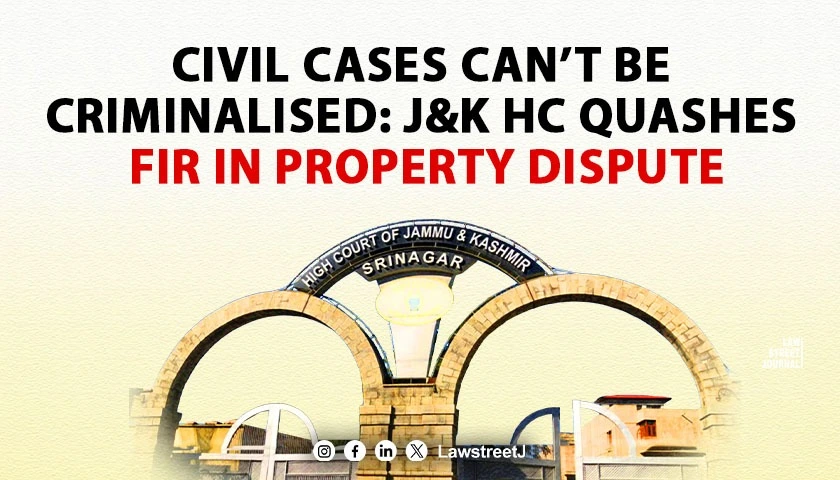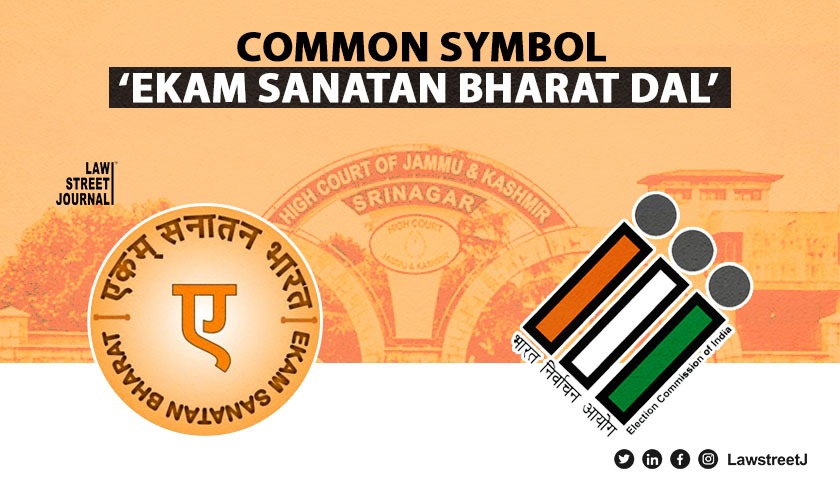Jammu: The Jammu & Kashmir High Court has quashed criminal proceedings against two nephews accused of outraging modesty and criminal trespass, emphasizing that civil disputes cannot be given a criminal colour to harass opponents.
Justice Sanjay Dhar addressed Criminal Misc. Application No. 267 of 2022 filed by Raja Asif Farooq and another, seeking quashing of FIR No. 266/2020 registered with Police Station Sadder, Srinagar, for offences under Sections 354 and 447 of the IPC. The court noted, “The petitioners, through the medium of the present petition, have challenged FIR No. 266/2020 for offences under Sections 354 and 447 of the IPC registered with Police Station Sadder, Srinagar.”
Addressing the allegations in the FIR, the court observed, “As per the impugned FIR, on 08.11.2020 at about 3:00 p.m., while the complainant was working on her land situated at Bye-pass Hyderpora, the petitioners arrived and obstructed her from working in her field. It is alleged that the petitioners hurled abuses at the prosecutrix, and when she objected, petitioner No. 2, Showkat Ahmad Wani, pushed her, causing her to fall and her headgear to drop — which is alleged to amount to outraging her modesty.”
Highlighting the underlying property dispute, the court stated, “The petitioners have challenged the impugned FIR on the grounds that their predecessor-in-interest and the respondent, who happened to be his sister, were co-owners of the land measuring 01 kanal 15 marlas under Survey No. 759/59 situated at Hyderpora, Srinagar.”
On the issue of Section 354 IPC, the court emphasized the requirement of intent, stating, “Intent to outrage or the knowledge that the offending act would outrage the modesty of a woman is a basic ingredient of the offence under Section 354 IPC. Mere assault or use of criminal force, simpliciter, without intent, would not amount to an offence under this section.”
Regarding the facts, the court observed, “In the present case, the petitioners and the complainant had an altercation, during which she was pushed down, resulting in her headgear falling off. There is nothing in the complainant’s statement or in the material collected during investigation to suggest that the petitioners intended to outrage her modesty.”
On the relationship between the parties, the court noted, “This Court is mindful that the complainant is a septuagenarian lady and the petitioners are her nephews. Given her age and their familial relationship, it is difficult to conceive that they intended to outrage her modesty.”
As for the criminal trespass charge, the court clarified, “The gist of the offence under Section 447 IPC is that the property must be in possession of the victim. If the property is not shown to be in the complainant’s possession, but rather in possession of the accused, the offence of criminal trespass is not made out.”
The court also highlighted investigative lapses: “A perusal of the Case Diary reveals that though the Investigating Agency claims to have completed the investigation, it failed to demarcate the land in question or prepare a site plan through the revenue agency.”
In a significant observation on misuse of criminal law, the court stated, “The facts suggest that the complainant attempted to settle a civil dispute by giving it a criminal colour, prompting her to lodge the FIR.”
Citing Supreme Court precedent, the court noted, “The Supreme Court has repeatedly disapproved of attempts to criminalize civil disputes. In Md. Ibrahim & Ors. v. State of Bihar & Anr., AIR 2010 SC (Supp) 347, the Court warned against converting civil cases into criminal proceedings to pressurize the accused.”
“Accordingly, the petition is allowed, and the impugned FIR and the proceedings arising therefrom are quashed.”
The court further emphasized that continuing criminal proceedings in such cases would amount to an abuse of the process of law, stressing that courts must prevent their use as tools for settling civil scores.
Counsel: Mr. Prince Hamza appeared for the petitioners; Mr. Mohsin-ul-Showkat Qadiri, Sr. AAG, and Mr. Faheem Nisar Shah, GA, appeared for the State.
Case Title: Raja Asif Farooq & Anr. v. UT of J&K and Others




![Publicly slapping wife does not constitute outraging modesty: J&K HC [Read Order]](/secure/uploads/2024/02/lj_7549_husband-slapping-wife-publicly.webp)
![Jammu and Kashmir High Court Grants Bail To Gang Rape Accused, Emphasizes Presumption Of Innocence [Read Order]](/secure/uploads/2024/05/lj_6000_5007a767-4748-4bed-9dab-8fa14a4d262b.webp)
![Mere involvement of relatives in anti national activities in the past can not be a ground to deny Govt contracts: J&K and Ladakh HC [Read Judgment]](/secure/uploads/2024/06/lj_3301_79dd6df6-5b62-4057-8762-d0e460af98e6.webp)






